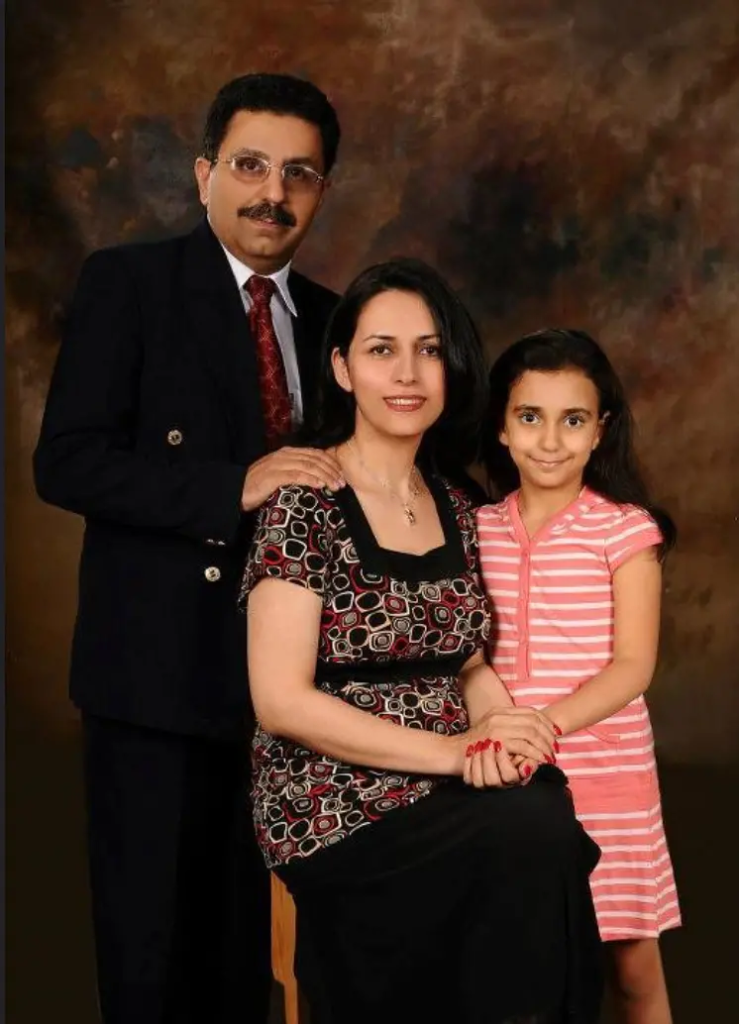Source: www.bbc.com
Rooja Asadi
Translation by Iran Press Watch

Keyvan Rahimian, a Baha’i citizen imprisoned in Iran, penned a letter addressed to his late wife from Evin prison, detailing the plight faced by his family and many other Baha’i families in Iran following the revolution.
Keyvan Rahimian was arrested in July 2023 and was once again sentenced to heavy imprisonment.
His wife, Fereshteh Sobhani, passed away from cancer 12 years ago when Mr. Rahimian was released from prison on bail. Keyvan Rahimian was then sent back to prison in 2012 to serve a five-year sentence, during which he mourned his wife.
He, along with his brother Kamran and sister-in-law Faran Hesami, were imprisoned in connection with the case of the Baha’i University (BIHE) and entrusted their children to their mother, Afagh Khosravizand.
In this letter, Mr. Rahimian writes about the discrimination and exclusions imposed on them as a Baha’i family, including the challenges that young Baha’is, such as his daughter Zhina, face in their desire to study in Iranian universities:
“It is very strange that after 40 years Baha’i youth are still deprived of the right to education as one of the most basic rights of citizenship, and with the passing of all these years, Zhina is still discriminated against like you, me, and many other young people.”
In another part of his letter, he wrote that “as a Bahá’í, he has been deprived of another of his citizenship rights, which is the right to legally publish books with an official permit.”
He mentioned completing the unfinished translation of the book “Education of Children with Loving Kindness,” which his wife had started before her death, in prison. However, not only were they not allowed to print the book, but they were also prohibited from reprinting previously published books by him and his brother.
Mr. Rahimian recounted his recent arrest, when he was apprehended on July 18 on charges of “propagating the Baha’i faith through psychology and community classes and conspiring against national security.” He spent 45 days in solitary confinement without being permitted to communicate with the outside world. This lack of communication caused extreme worry for his elderly mother and young daughter.
Afagh Khosravizand, Keyvan Rahimian’s mother, wrote in a social media post at that time:
“I am Afagh, and I call out to you from afar, my son, Keyvan: We haven’t heard from you for 40 days, neither by phone nor through any visit. We are concerned about your mental and physical well-being…These 40 days are not the first time we’ve encountered this. We have experienced this recurring ordeal for over 40 years. The story of worry and lack of any news, uncertainty and fear, longing for justice and freedom.”
Afagh Khosravizand passed away in November 2022, while her son was in prison. However, the prison authorities did not permit Keyvan Rahimian to attend his mother’s funeral and memorial service.

In his letter, Mr. Rahimian explained that security agents did not allow his mother to be buried in Golestan Javid, the Baha’i cemetery in Tehran, as is the case for many other Baha’is.
Baha’is consistently encounter obstacles in burying their loved ones, and sometimes their tombstones are destroyed. Recently, security agents have tightened restrictions further, disallowing Baha’is from being buried in Tehran’s Golestan Javid (Baha’i cemetery), and forcing them to bury their loved ones in Khavaran, where victims of political executions in the 1980s were clandestinely buried in mass graves.
Keyvan and Kamran Rahimian were unable to bury their mother, Afagh Khosravizand, in the Baha’i cemetery in Tehran, and security agents compelled them to bury her in the Khavaran mass graves. However, they decided to donate their mother’s body to Tehran University for medical research instead of burying her in Khavaran.
In an Instagram post, they stated: “In order to preserve the independence of the Baha’i community, to respect the sanctity of the souls in Khavaran, including our father, and in accordance with Afagh’s desire to promote learning and education, as well as her steadfast support for our education, we chose to dedicate our dear mother’s body to medical research and the education of students at Tehran University Medical School.”
However, the university informed them that they “had no need for a cadaver,” and their mother’s body was ultimately buried in Khavaran, in an unmarked grave. Mr. Rahimian writes: “The right to access Golestan Javid (Baha’i Cemetery) has been violated many times in these 45 years, just like many other civil rights. These violations include the confiscation of Golestan cemetery, destruction of graves, prohibition of burials within the city, and the relocation of the deceased for burial in another city.”
Afagh Khosravizand is now buried in a location believed to be where her husband was buried in mass graves.
The discrimination and injustice faced by the Rahimian family began in the early years after the revolution when the Iranian government imprisoned their father, Rahim Rahimian, in 1983 for the crime of being a Baha’i. According to relatives, he was executed in 1984 after enduring “severe torture.”
Rahim Rahimian’s body was never returned to his family. They believe he was buried in Khavaran.
Despite the discrimination and exclusions imposed on Baha’is in Iran, Mr. Rahimian expressed in his letter:
“The greatest suffering, pain, and discrimination against us is that we are deprived of serving and contributing what we are capable of for the prosperity and well-being of our beloved country, Iran. We remain hopeful that amidst the deepest darkness and the darkest hours of the night, the dawn of brightness and daylight will eventually come.”
Leave a Reply